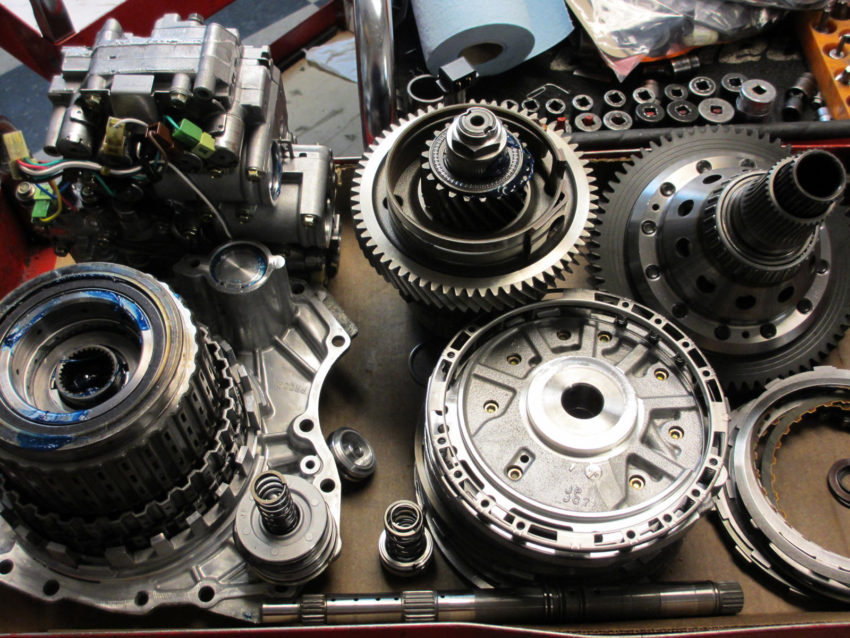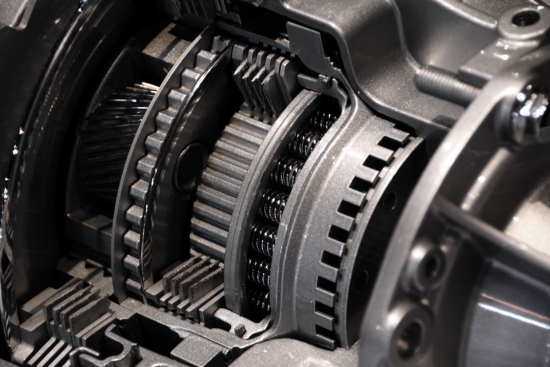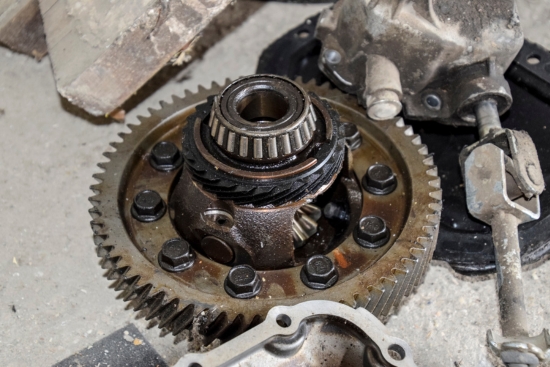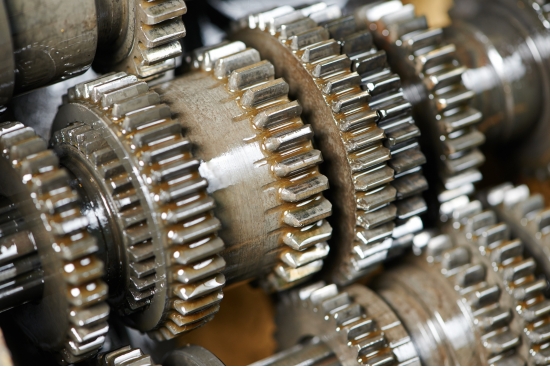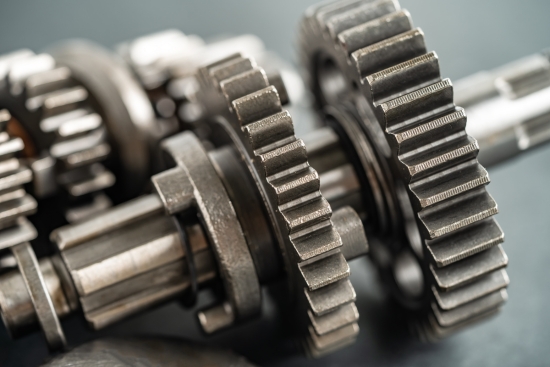Rebuilt transmissions can save you a lot of money and offset some of the risk of buying one used. While a rebuilt transmission will cost more, it will improve the performance and longevity of it. Compared to getting a new transmission, a rebuild is about 50% less. Below I will discuss where to find rebuilt transmissions near me, common questions, the pros and cons, and what your other options are.
Map of Rebuilt Transmissions Near Me
For “Rebuilt Transmissions Near Me” see the map below…
Who Rebuilds Transmissions Near Me
The transmission rebuilding industry is growing. You can find various companies that perform this service like mechanic shops, machine shops, transmission shops, commercial fleet companies, equipment manufacturers, and even some salvage yards.
The three biggest names in the rebuilding and remanufacturing of transmissions are:
There are two different styles of companies in this space. Those who rebuild transmissions and sell them pre-done or companies that you can bring a tranny to and they will do the rebuild for you. In many cases, you may already have the transmission, but you lack the skills, time, or equipment to do the work.
What is a Rebuilt Transmission?
A rebuilt transmission is the disassembly of a used transmission, inspecting all of the parts, and only replacing parts or components that are worn out or damaged. If parts or internal components are still functioning they are left as is in the build. For example, a rebuilt transmission might have the valve body and torque converter replaced but leave the bands, clutch, and original pumps alone.
Why Rebuild?…
A rebuild can help get more life out of the transmission. It makes better use of serviceable parts instead of replacing parts or components that are functioning. There are 4 common signs that you need to rebuild or at least know it’s time to address the issues:
- Transmission has a smell like burning plastic, as a sign of overheating.
- The clutch doesn’t shift into a gear or any gear, which is a sign of worn-out gears.
- Grinding noises in neutral. Can be solved with a fluid flush, but could be due to worn-out bearings and a reverse idler gear issue.
- Redish color fluid leak under the vehicle. We might just need to replace a seal, but if it’s been leaking for a long time it can be indicative of larger problems.
Rebuild vs Remanufacture
Many people use these terms to mean the same, but they are different. A remanufactured transmission is a complete tear-down to restore it to “like” new condition. Parts get replaced, machined, modified, refinished, etc. It is then tested against the factory tolerances and needs to meet all the OEM specifications. Once it meets the standards it is certified as remanufactured.
It’s important for customers to distinguish between rebuilt and remanufactured. A remanufactured transmission is a complete overhaul of an engine (except the body) to restore the engine to “like new”. It is benchmarked against the OEM factory tolerances and certified as remanufactured.
Does a Rebuild Depend on Whether it is Automatic or Manual?
No, either type of manual transmission that can be rebuilt. The cost isn’t even dependent on the grearing, it’s more driven by the amount of work and parts needed.
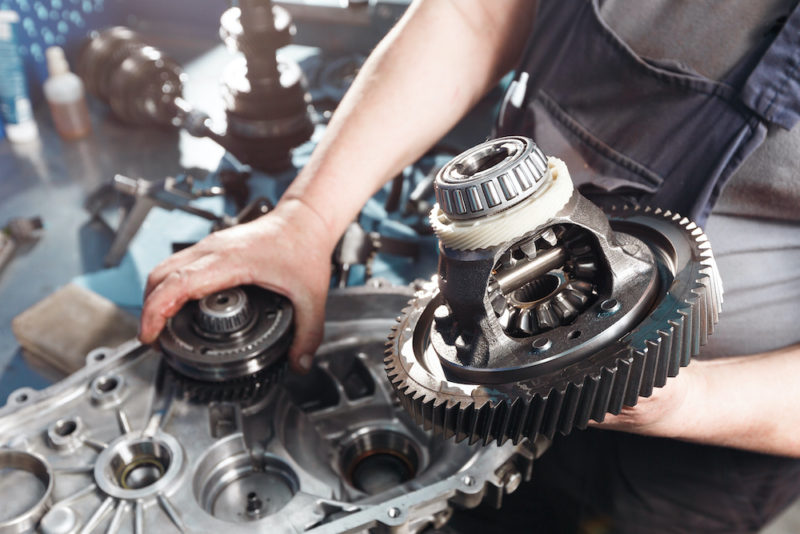
What to Expect When You Drop Off a Transmission?
Every rebuilder follows their own process. Speaking through from my experience with the places who rebuild transmissions near me, here is what you can expect:
- Drop Off: You ship or drop off your transmission and fill out some paperwork.
- Disassembly: The transmission is stripped down to the bare bones. The components and parts are chemically cleaned and inspected. Parts are sorted, analyzed, and labeled as working, repairable, or replaced.
- Quote: A price quote is derived that includes costs for labor, replacement parts, mods, machining, refinishing, coatings, and other repair work. You will also get an estimate of time to complete at this stage.
- Required Deposit: If you approve the quote, you will be required to pay 50% upfront before the work starts.
- Order Needed Parts: They will order or source all the parts needed.
- Machining/Refinishing: Parts are machined, bored, and modified to exact tolerances (check with your rebuilder as this is part of remanufacturing).
- Reassembly: The transmission and all the components are then reassembled.
- Shipped: The transmission is shipped back to you or you pick it up.
Do Rebuilt Transmissions Come with a Warranty?
A rebuilt transmission usually features a 12-month/12,000-mile warranty (depending on which event happens first). The warranties are low coverage, at best price but will reimburse for repairs should any parts prove to be defective in the tranny or the torque converter.
Most warranties on transmission rebuilds stipulate which shops are authorized to do the repair work. You have to read the fine print, because some also do not cover the $80-$100/hr labor costs.
Pros and Cons of Rebuilt Transmissions
Rebuilt transmissions can be great, but there are both pros and cons to consider before deciding to purchase or do a rebuild…
Pros
- Less expensive than a new transmission
- Less expensive than a remanufactured transmission
- More reliable and dependable a used transmission.
- Often backed by warranty programs (Unless done DIY).
- Saves energy related to processing salvaged engines and vehicles.
- Factory transmission rebuilds have low error rates.
Cons
- Costs more than a used transmission
- Less reliable than a new or remanufactured transmission
- Parts and components that were left as is, might need replacement later.
- A rebuilt transmission still must be integrated into a vehicle which can create new problems.
- The rebuild quality is dependent on how good the mechanic is.
- A rebuild doesn’t rely on OEM parts, any after-market parts are used. After-market parts don’t often meet the same standards as OEM parts and may have wear and tear faster than you expected.
- The owner is responsible for the service and rebuild cost, regardless if the transmission experience issues later.
- Warranties cover the tear-down and rebuild, but often leave out labor and replacement parts.
Alternatives to Finding Rebuilt Transmissions Near Me
Aside from a rebuild you could also consider a new, used, or remanufactured transmission.
A new transmission is going to be the most expensive choice ford you. On the flip side though you are getting new parts, reliability, and a factory warranty.
A used transmission, from a salvage yard will be the cheapest option. There are however risks when it comes to reliability and dependability. While at a salvage you can find newer transmissions, it still comes with risks. You can reduce some of the risks of getting a used tranny at a salvage but purchasing a warranty. A salvage warranty is usually 30 days, with no cash back, and credit or exchange only. There are certainly more reasons to chose a rebuilt part over a used part.
A remanufactured transmission will be more expensive than a rebuild, but less than a new one. The remanufacturing process is a total overhaul of the parts and components. The purpose is to bring the transmission back to “like new” condition. To meet the remanufactured standards the entire transmission assembly must meet the OEM factory tolerances and specs in order to be certified as remanufactured. Remanufactured transmissions are more reliable than rebuilds and will come with much better warranties.
For more info read: Used vs Rebuilt vs Remanufactured Auto Parts.
The Cost of a Rebuild vs a New Transmission…
In 2014, according to Angie’s List, a transmission rebuild cost $2,800 to $3,800. They also cite the cost of a new replacement transmission as $4,000 to $8,000. Neither option is great, but you can see where the rebuild is substantially less.
Can You Rebuild a Transmission Yourself
Yes and in fact many people do. Whether it’s for a replacement, repair, or restoration effort, it is common for people to DIY it. There is plenty of information on YouTube and Google to learn how to do this yourself. Here is a related article walking you through the steps.
The most important step in the process in my opinion is planning and research up front. This can help you avoid making costly mistakes.
Step By Step Rebuild of an Automatic Transmission
Future of Rebuilt Transmissions in the Automotive Industry
Technological Advancements in Transmission Rebuilding
The automotive industry is rapidly evolving, and with it, the realm of rebuilt transmissions is witnessing significant technological advancements. Modern rebuilding processes now incorporate state-of-the-art techniques to ensure that every rebuilt transmission meets and often exceeds OEM standards. This includes the meticulous refurbishment of all the internal components, such as the output shaft, planetary gears, and clutch packs.
In recent years, there has been a notable shift towards using quality reconditioned transmissions in both gasoline and diesel vehicles. This is not just limited to everyday cars and trucks but also extends to high-performance vehicles like hot rods. The focus is on enhancing the durability and efficiency of these transmissions. For instance, re-machined parts are now more commonly used, replacing worn or damaged parts with highest quality parts that offer better performance and longevity.
Another significant development is the increasing precision in addressing known factory defects. In the past, factory defects in used transmissions might have been overlooked, but now, they are identified and rectified as part of the rebuilding process. This meticulous attention to detail ensures that a rebuilt transmission is as good as a new transmission, if not better.
Predictions for the Future Market and Trends
Looking ahead, the market for rebuilt transmissions is poised for growth. As consumers become more environmentally conscious, the appeal of remanufactured components over brand-new ones is increasing. This trend is particularly relevant for owners of older vehicles or import cars, who prefer to maintain their existing vehicles rather than purchasing new ones.
The demand for rebuilt automatic transmissions and manual transmissions is expected to rise, especially in the diesel vehicles segment. This is partly due to the cost-effectiveness of rebuilding over buying new. With best price guarantees and options like flat rate shipping, residential delivery, and liftgate service, customers find more value in choosing a rebuilt unit.
Furthermore, the industry is likely to see a surge in specialized service providers who can cater to specific needs. These go-to suppliers will not only offer rebuilt transmissions but also provide comprehensive services, including installation and after-sales support. The core charge system, where customers can exchange their old transmission for a discount on a rebuilt one, is also expected to become more prevalent.
In conclusion, the future of rebuilt transmissions in the automotive industry looks promising. With technological advancements, a focus on quality parts and strict specifications, and a growing market demand, this sector is set to thrive. As more customers seek sustainable and cost-effective solutions for their vehicles, rebuilt transmissions will continue to be a popular choice.
Rebuilt Transmission Near Me – Conclusion
If you see any signs of issues with your transmission it is important to address them right away. Not every tranny issue requires a rebuild, but it is an option in the right situation.
Finding a good shop to do the rebuild or buying from a reputable shop is a good idea and you should ask about the warranty before you buy it. This is what I have learned from the places who rebuild transmissions near me.

